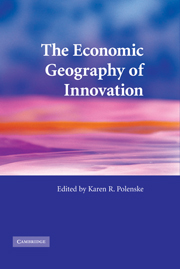Book contents
- Frontmatter
- Contents
- List of figures
- List of tables
- Notes on contributors
- Acknowledgments
- Abstracts
- List of abbreviations and acronyms
- Part I Concepts and measurements in innovation
- Part II Institutional and spatial aspects of information and knowledge flows
- 5 Tacit knowledge in production systems: how important is geography?
- 6 The self-aware firm: information needs, acquisition strategies, and utilization prospects
- 7 Theorizing the gendered institutional bases of innovative regional economies
- 8 Multinationals and transnational social space for learning: knowledge creation and transfer through global R&D networks
- 9 Brain circulation and regional innovation: the Silicon Valley–Hsinchu–Shanghai triangle
- Part III Institutions and innovation systems
- Index
- References
5 - Tacit knowledge in production systems: how important is geography?
Published online by Cambridge University Press: 22 September 2009
- Frontmatter
- Contents
- List of figures
- List of tables
- Notes on contributors
- Acknowledgments
- Abstracts
- List of abbreviations and acronyms
- Part I Concepts and measurements in innovation
- Part II Institutional and spatial aspects of information and knowledge flows
- 5 Tacit knowledge in production systems: how important is geography?
- 6 The self-aware firm: information needs, acquisition strategies, and utilization prospects
- 7 Theorizing the gendered institutional bases of innovative regional economies
- 8 Multinationals and transnational social space for learning: knowledge creation and transfer through global R&D networks
- 9 Brain circulation and regional innovation: the Silicon Valley–Hsinchu–Shanghai triangle
- Part III Institutions and innovation systems
- Index
- References
Summary
Introduction
Within the field of innovation studies and technological change, the distinction between tacit and codified knowledge has recently been accorded great significance. Much of this interest was stimulated by Nelson and Winter (1982), whose classic work An Evolutionary Theory of Economic Change made extensive use of the concept of tacit knowledge in their analysis of how organizational routines shape technological change. In so doing, these authors have helped revive widespread interest in the earlier work of Michael Polanyi (1958, 1966), to the point where tacit knowledge has come to be recognized as a central component of the learning economy (Lundvall and Johnson 1994) and a key to innovation and value creation.
Moreover, tacit knowledge has come to be acknowledged as a prime determinant of the geography of innovative activity, since its central role in the process of learning-through-interacting tends to reinforce the local over the global. Those interested in the geographical structure of production and innovation systems have argued that the strong tacit component of leading-edge technical knowledge induces (indeed, requires) spatial clustering for the purposes of knowledge sharing that leads to innovation (Cooke and Morgan 1998; Maskell and Malmberg 1999). For a growing number of scholars, this explains the perpetuation and deepening of geographical concentration in a world of expanding markets, weakening borders, and ever-cheaper and more pervasive communication technologies.
- Type
- Chapter
- Information
- The Economic Geography of Innovation , pp. 87 - 111Publisher: Cambridge University PressPrint publication year: 2007
References
- 16
- Cited by



